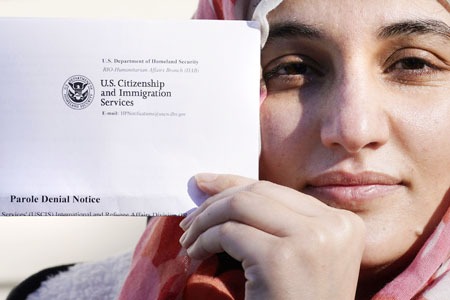BOSTON: Haseena Niazi had pinned her hopes of getting her fiancé out of Afghanistan on a rarely used immigration provision.
The 24-year-old Massachusetts resident was almost certain his application for humanitarian parole would get approved by the US government, considering the evidence he provided on the threats from the Taliban he received while working on women’s health issues at a hospital near Kabul.
But this month, the request was summarily denied, leaving the couple reeling after months of anxiety.
“He had everything they wanted,” said Niazi, a green card holder originally from Afghanistan. “It doesn’t make any sense why they’d reject it. It’s like a bad dream. I still can’t believe it.”
Federal immigration officials have issued denial letters to hundreds of Afghans seeking temporary entry into the country for humanitarian reasons in recent weeks, to the dismay of Afghans and their supporters. By doing so, immigrant advocates say, the Biden administration has failed to honor its promise to help Afghans who were left behind after the US military withdrew from the country in August and the Taliban took control.
“It was a huge disappointment,” said Caitlin Rowe, a Texas attorney who said she recently received five denials, including one for an Afghan police officer who helped train US troops and was beaten by the Taliban. “These are vulnerable people who genuinely thought there was hope, and I don’t think there was.”
Since the US withdrawal, US Citizenship and Immigration Services has received more than 35,000 applications for humanitarian parole, of which it has denied about 470 and conditionally approved more than 140, Victoria Palmer, an agency spokesperson, said this week.
The little-known program, which doesn’t provide a path to lawful permanent residence in the country, typically receives fewer than 2,000 requests annually from all nationalities, of which USCIS approves an average of about 500, she said. Palmer also stressed humanitarian parole is generally reserved for extreme emergencies and not intended to replace the refugee admissions process, “which is the typical pathway for individuals outside of the United States who have fled their country of origin and are seeking protection.”
The US government, meanwhile, continues to help vulnerable Afghans, evacuating more than 900 American citizens and residents and another 2,200 Afghans since the military withdrawal. The state department said it expects to help resettle as many as 95,000 people from Afghanistan this fiscal year, a process that includes rigorous background checks and vaccinations. Many of them, however, had been whisked out of Afghanistan before the US left. Now, USCIS is tasked with this new wave of humanitarian parole applications and has ramped up staffing to consider them.
The agency said in a statement that requests are reviewed on an individual basis, with consideration given to immediate relatives of Americans and Afghans airlifted out.
And while USCIS stressed that parole shouldn’t replace refugee processing, immigrant advocates argue that isn’t a viable option for Afghans stuck in their country due to a disability or hiding from the Taliban. Even those able to get out of Afghanistan, they say, may be forced to wait years in refugee camps, which isn’t something many can afford to do.
Mohammad, who asked that his last name not be used out of fear for his family’s safety, said his elder brother, who used to work for international organizations, is among them. He has been in hiding since the Taliban came looking for him following the US withdrawal, Mohammad said.
On a recent visit to the family home, Taliban members took his younger brother instead and held him more than a week for ransom, he said. Now, Mohammad, a former translator for US troops in Afghanistan who lives in California with a special immigration status, is seeking parole for this brother, too. He hopes a conditional approval letter can get them a spot on one of the US evacuation flights still running out of the country.
“I can provide him housing. I can provide him everything,” he said. “Let them come here.”
Immigrant advocates began filing humanitarian parole applications for Afghans in August in a last-ditch effort to get them on US evacuation flights out of the country before the withdrawal.
In some cases, it worked, and word spread among immigration attorneys that parole, while typically used in extreme emergencies, might be a way out, said Kyra Lilien, director of immigration legal services at Jewish Family & Community Services in California’s East Bay.
Soon, attorneys began filing thousands of parole applications for Afghans.
When the US immigration agency created a website specifically to address these applications, Lilien said she thought it was a sign of hope. By November, however, the agency had posted a list of narrow criteria for Afghan applicants and held a webinar telling attorneys that parole is typically granted only if there’s evidence someone faces “imminent severe harm.”
A few weeks later, the denial letters began arriving. Lilien has received more than a dozen but no approvals. “Once the US packed up and left, anyone who was left behind has only one choice, and that is to pursue this archaic refugee channel,” she said. “It is just so angering that it took USCIS so long to be clear about that.”
- Latest
- Trending





